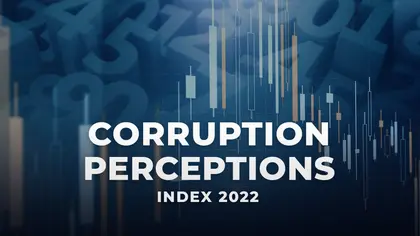Ukraine’s ranking in the global Corruption Perceptions Index (CPI) 2022 has risen six places, from 122nd in 2021 to 116th in the latest rankings.
In points terms, from 0 meaning “highly corrupt” to 100 meaning “very clean,” Ukraine gained only one point to score 33.
JOIN US ON TELEGRAM
Follow our coverage of the war on the @Kyivpost_official.
The latest annual data have been shared exclusively with Kyiv Post by the Ukrainian branch of the global anticorruption movement Transparency International (TI).
The EU averages 66 points, while Eastern Europe and Middle Asia average 35 points.
The leading countries have not changed for several years, with Denmark scoring 90 points and New Zealand and Finland each scoring 87 points.
Countries with the lowest scores include Somalia (12 points and 180th place in the index), Southern Sudan and Syria (each scoring 13 points).
In Eastern Europe, the leaders are Poland (55 points and 45th place), Slovakia (53 points and the 49th place) and Romania (46 points and the 63rd place).
Ukraine is ahead of the Russian Federation (28 points and 137th place) but lags behind Moldova and Belarus (39 points each).
Ukraine’s ranking in the global Corruption Perceptions Index (CPI) 2022 has risen six places, from 122nd in 2021 to 116th in the latest rankings.
In points terms, from 0 meaning “highly corrupt” to 100 meaning “very clean,” Ukraine gained only one point to score 33.
The latest annual data have been shared exclusively with Kyiv Post by the Ukrainian branch of the global anticorruption movement Transparency International (TI).

Scandalous Ukrainian Lawmaker Suspected of Hiring Thugs to Beat Up Veteran
The EU averages 66 points, while Eastern Europe and Middle Asia average 35 points.
The leading countries have not changed for several years, with Denmark scoring 90 points and New Zealand and Finland each scoring 87 points.
At the same time, Ukraine belongs to the group of 25 countries which have significantly improved their indicators within last ten years (+ 8 points since 2012).
Countries with the lowest scores include Somalia (12 points and 180th place in the index), Southern Sudan and Syria (each scoring 13 points).
In Eastern Europe, the leaders are Poland (55 points and 45th place), Slovakia (53 points and the 49th place) and Romania (46 points and the 63rd place).
Ukraine is ahead of the Russian Federation (28 points and 137th place) but lags behind Moldova and Belarus (39 points each).
At the same time, Ukraine belongs to the group of 25 countries which have significantly improved their indicators within last ten years (+ 8 points since 2012).
Despite Russia’s full-scale invasion and threat to its statehood, TI views Ukraine’s progress in fighting corruption as sustainable.
TI Ukraine cited the following positive achievements in Ukraine in 2021: adoption of the state anticorruption strategy; long awaited appointment of the head of the Specialized Anticorruption Prosecutor’s Office; and effective work of the High Anticorruption Court of Ukraine (49 considered cases and 37 decisions).
Looking ahead, Ukraine needs to win the war with Russia and succeed in achieving EU integration. The latter is impossible to achieve without effective anticorruption reforms, TI Ukraine stated.
The organization points to four measures that should be implemented in 2023 to improve Ukraine’s fight against corruption and launch an effective rebuild of the country:
Appoint professional, unbiased and honest heads of the various anticorruption bodies: the National Anticorruption Bureau, the National Agency for Corruption Prevention; and the Asset Recovery and Management Agency;
Complete justice reform based on the conclusions of the Venice Commission;
Open public registers and databases where possible and where this does not harm security and defense;
Renew submissions of public officials’ asset declarations and their monitoring by the Agency for Corruption Prevention;
Renew submissions of public reports by political parties.
Despite Russia’s full-scale invasion and threat to its statehood, TI views Ukraine’s progress in fighting corruption as sustainable.
Use the Prozorro public procurement system to support rebuilding of Ukraine and securing effective monitoring and oversight of public tenders.
The Corruption Perceptions Index has been measured by TI since 1995. Each country’s score is calculated based on a combination of at least three data sources drawn from 13 different corruption surveys and assessments. These data sources are collected by a variety of reputable institutions, including the World Bank and the World Economic Forum.
You can also highlight the text and press Ctrl + Enter









